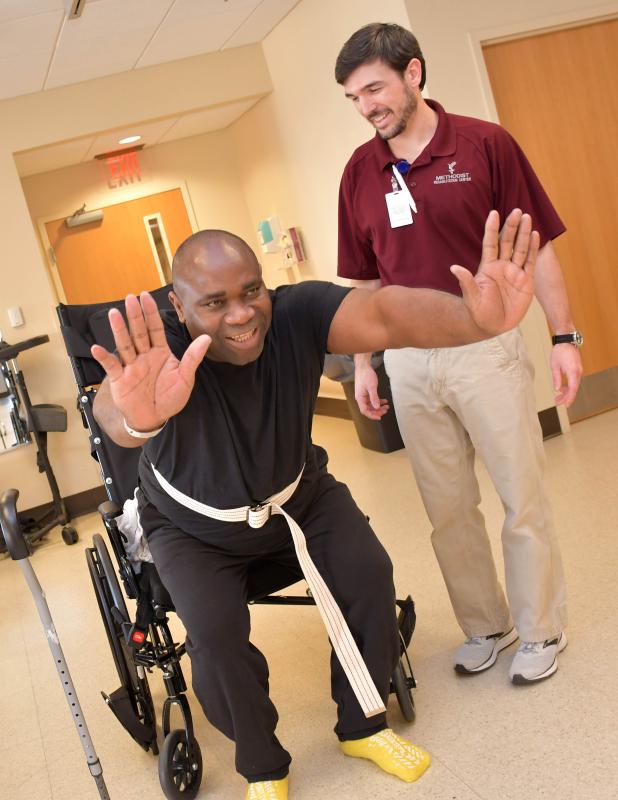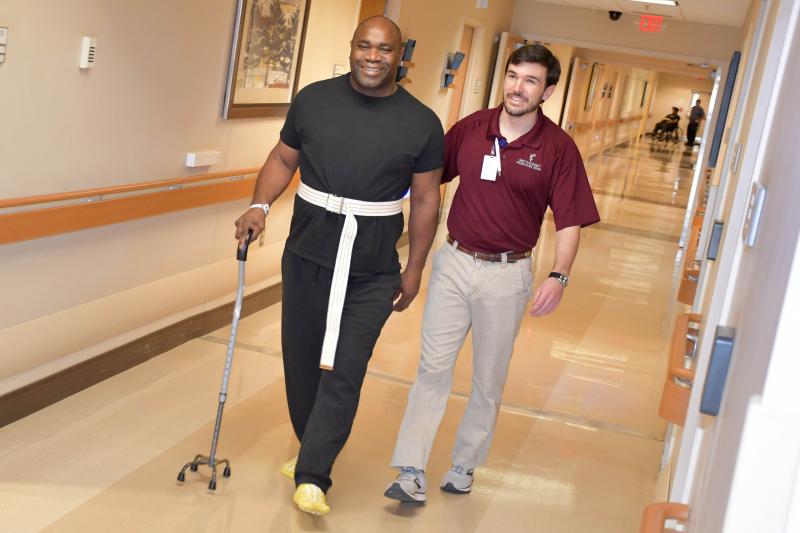As a running back for the 1989 Ole Miss Rebels, Drew native Ed Thigpen amassed 327 yards rushing, scored five touchdowns and made the front page of USA Today.
Yet he says the best moment in his life happened in the therapy gym of Methodist Rehabilitation Center in Jackson.
“I stood up without needing anything for one minute,” he said.
That might seem a tiny victory for someone Ole Miss Coach Billy Brewer called “my kind of guy” for his hard-nosed playing style.
But Thigpen had been humbled by a health scare he never expected.
“I woke up on Dec. 18 and couldn’t move anything from the waist down,” said Thigpen, who is Drew’s assistant Chief of Police and also a supervisor at the State Penitentiary at Parchman.
Thigpen first thought his legs were asleep. But when he couldn’t even lift them with his hands, he began googling stroke symptoms.
“I had none of the 10,” he said. So he figured he might be having a light heart attack.
Tests at a hospital in Clarksdale revealed possible spinal problems, and Thigpen was flown to Methodist Le Bonheur Hospital in Memphis.
Doctors there found a cyst the size of a golf ball on his spine. And Thigpen was told he’d need immediate surgery to prevent the possibility of lifelong paralysis.
“After the doctor explained it, I said: Where do I sign? By 4:30 a.m., they were prepping me for surgery.”
When the surgeon came by the next day, he asked Thigpen: “What can you do?”
Thigpen slid a leg sideways, and the surgeon got emotional.
“He hugged me and said: ‘God is good,’” Thigpen said. “I could see the excitement of him seeing I was moving. That motivated me, too.”
As he got ready to start rehab, Thigpen said he initially planned to go to a facility in the Delta where he’d be close to family. But a social worker at his first choice advised he’d be better off at Methodist Rehab.
“She said we do therapy three days a week. But there’s a place in Jackson that does three hours a day, five days a week and it’s intense. She said I think that’s what you need. And I owe her—I did need five days a week. Finding Methodist Rehab was the best decision I ever made. At the time, I couldn’t do anything but wiggle my toes.”
The day after Thigpen’s Jan. 2 arrival at Methodist Rehab, physical therapist Chris McGuffey put him through a series of tests to gauge his abilities. And when he was asked to stand between two parallel bars, Thigpen tried to get by using his arms for support.
“Chris said: ‘You might not know this, but you’ve got strength in your legs and you’re going to walk,’” Thigpen said. “And that day motivated me to do what I had to do.”
Accustomed to working a graveyard shift, Thigpen often awoke in the wee hours of the morning. So he asked his therapists for exercises he could do in bed.
“I’d do leg raises, leg scissors and lift my hips—anything to make me stronger,” he said.
“He’s one of the most motivated patients I’ve ever had,” said Methodist Rehab occupational therapist Chuck Crenshaw.
Crenshaw said he was aware of Thigpen’s athletic ability because his dad had been a big fan of his playing style.
“He was just a big, strong physical runner who would just run you over,” Crenshaw said. “So it made sense he could fight through all this.”
“His approach was to come in with an athlete’s work ethic,” said Methodist Rehab physical therapist Kollin Cannon. “He wanted to push himself. He would tell me if things were too easy.”
He’d also add his own workouts to the therapy mix. “He’d say: ‘I’m going to add eight squats here,’” Cannon said.
All the hard work made for a quick recovery. Thigpen went from barely able to stand on shaky legs to meeting his goal to walk out of Methodist Rehab on Jan. 22.
“I did believe I’d be independent again, but I’m walking further than I ever imagined,” Thigpen said.
And he said he has a lot of people to thank for his progress.
“You cannot do this without family support, community support and religious support,” said the father of four and deacon for Mt. Israel Baptist Church.
Thigpen said he’s also grateful for Methodist Rehab’s staff. And he hopes to be of service by volunteering at the Jackson hospital once a month.
“They are positive, and they care,” he said. “I owe this place a lot.”


